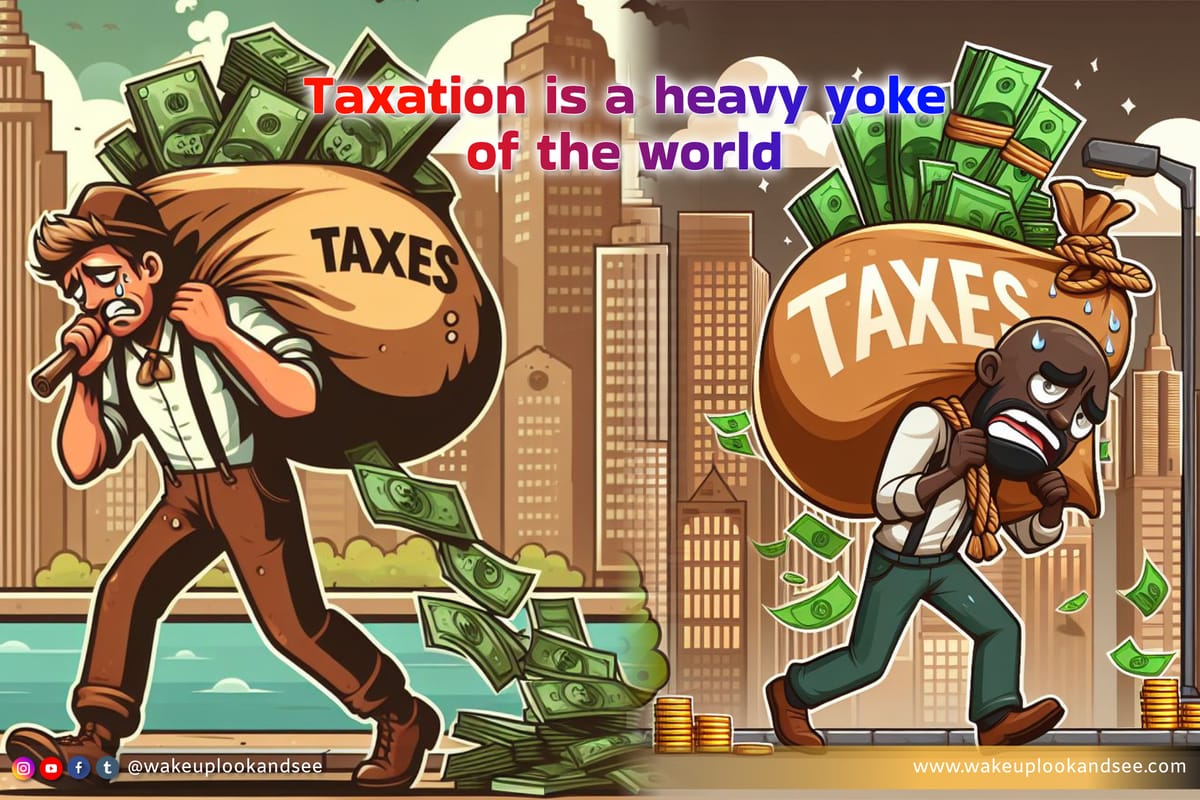Taxes is not in the kingdom of God
Taxation is a system of slavery that diminishes everyone's life on earth, bonding them in the service of the leaders instead of having a good life.

The topic of paying taxes is undoubtedly very explosive. The most common belief is that taxes are a part of life without question. This belief may stem from the practice of taxation, which has existed for centuries; or perhaps it is because of Benjamin Franklin's famous quote.
Our new Constitution is now established, everything seems to promise it will be durable; but, in this world, nothing is certain except death and taxes.
Benjamin Franklin
Considering the “West”—G7 and European Union—the Roman Empire has ruled the world for the last centuries, it is understandable why Benjamin Franklin’s statement is the norm.
Despite the traditional acceptance, Jesus disagrees with paying taxes, and this post will make that point. Many believe the opposite about Jesus, but I will show that taxes play no part under God’s rulership, and Jesus knows it.
Testifying of God is a reader-supported publication. To receive new posts and support my work, consider becoming a free or paid subscriber.
The Ingenious Pharisaical Trap
The following dialogue between Jesus and the Pharisees can also be found in Luke 20:20-26 and Mathew 22:16-22, which underpins the misconception that Jesus agreed that taxation is allowed by God. The question was rather ingenious and designed to be an inescapable trap to get Jesus arrested by the Romans or discredited in the eyes of the Jews who believed and followed him.
13. And they send unto him certain of the Pharisees and of the Herodians, to catch him in his words.
14. And when they were come, they say unto him, Master, we know that thou art true, and carest for no man: for thou regardest not the person of men, but teachest the way of God in truth: Is it lawful to give tribute to Cæsar, or not?
15. Shall we give, or shall we not give? But he, knowing their hypocrisy, said unto them, Why tempt ye me? bring me a penny, that I may see it.
16. And they brought it. And he saith unto them, Whose is this image and superscription? And they said unto him, Cæsar’s.
17. And Jesus answering said unto them, Render to Cæsar the things that are Cæsar’s, and to God the things that are God’s. And they marvelled at him.
Mark 12:13-17
To many, it appears that Jesus says paying taxes is acceptable in these verses, but this is far from the case. Jesus superbly navigated this question to avoid being arrested since his work was not yet complete and to avoid being discredited in the eyes of those who followed him and knew the laws of God.
The Pharisees intended to catch Jesus using his own words by first establishing with the audience that Jesus speaks the Word of God truthfully, irrespective of whom it concerns. After setting the stage in public, they asked an incredibly clever question: “Is it lawful to give tribute to Cæsar, or not?” or in modern language, “Should the Jews pay taxes to the Roman Empire?”. Jesus, knowing what they were up to, asked the question: “Why do you tempt me?”.
Irrespective, he answered the question by presenting a duality of understanding. Half the duality was crafted by focusing on the coin and Cæsar's face. This focus ensured that those who didn’t know the scriptures arrived at the understanding that he was endorsing paying taxes to Caeser. At the same time, the other half of the duality was crafted for those who knew the scriptures, who understood that everything belonged to God.
Answering no to this question would invoke the wrath of the Romans, and Jesus would most likely, at minimum, be arrested. Answering yes would discredit him with the Jews since tribute (taxes) is against the laws of God. And Jesus did not come to destroy the law.
17. Think not that I am come to destroy the law, or the prophets: I am not come to destroy, but to fulfil.
18. For verily I say unto you, Till heaven and earth pass, one jot or one tittle shall in no wise pass from the law, till all be fulfilled.
Matthew 5:17-18
Jesus Avoided PRISON & DEATH for a Reason
Why did Jesus give such an answer?
Jesus answered this way because he could not do the remaining work in prison. He made it clear in Matthew 5:17-18 that he did not come to destroy the law, but rather, to fulfil the scriptures.
After his resurrection, Jesus again clarified everything written in the scriptures for him to do must be completed. It is inconceivable that God would write a prophecy to be fulfilled by His son and leave it undone.
And he said unto them, These are the words which I spake unto you, while I was yet with you, that all things must be fulfilled, which were written in the law of Moses, and in the prophets, and in the psalms, concerning me.
Luke 24:44
There are many references to Jesus stating that it was not time to die and that he could call upon God for protection on his journey, including John 7:28-30 and Matthew 4:5-6. In addition, this following passage highlights vividly that Jesus was protected until all his work was complete.
52. Then said Jesus unto him, Put up again thy sword into his place: for all they that take the sword shall perish with the sword.
53. Thinkest thou that I can not now pray to my Father, and he shall presently give me more than twelve legions of angels?
54. But how then shall the scriptures be fulfilled, that thus it must be?
55. In that same hour said Jesus to the multitudes, Are ye come out as against a thief with swords and staves for to take me? I sat daily with you teaching in the temple, and ye laid no hold on me.
56. But all this was done, that the scriptures of the prophets might be fulfilled. Then all the disciples forsook him, and fled.
Matthew 26:52-56
Once the things he needed to do were finished, he allowed himself to be taken to fulfil the remainder of the scriptures—his persecution and sacrificial death.
God owns everything; Cæsar owns nothing!
Many scriptural passages show who the earth belongs to without question. God is the creator of everything and reigns sovereign.
Behold, the heaven and the heaven of heavens is the LORD’s thy God, the earth also, with all that therein is.
Deuteronomy 10:14
Psalms restate that God created heaven and earth, which belong to him.
The heavens are thine, the earth also is thine: as for the world and the fulness thereof, thou hast founded them.
Psalms 89:11
Other passages throughout, including 1 Corinthians 10:26, reinforce what all the Jews know to be true. God owns everything, and Cæsar owns nothing. Again, this understanding is reinforced in Daniel 4:34-37 where Nebuchadnezzar ate grass until he was humbled to recognise that God is sovereign. Similarly, Pontius Pilate was corrected by Jesus in John 19:11, saying that without God giving him the authority, he would have no say over whether Jesus lived or died.
Money
The money used in early Roman times was gold and silver, and in the following passage, God shows that the things that Cæsar considers to be his are, in fact, belonging to God.
The silver is mine, and the gold is mine, saith the LORD of hosts.
Haggai 2:8
Therefore, it is clear what Jesus meant when he said: “Render to Cæsar the things that are Cæsar’s”. Nothing belongs to Cæsar.
Taxes
In the next passage, Jesus gave guidance, saying that those who pay taxes are in bondage; they are not free, and he is sent to set them free in fulfilment of Isaiah’s prophecy (Luke 4:17-19).
24. And when they were come to Capernaum, they that received tribute money came to Peter, and said, Doth not your master pay tribute?
25. He saith, Yes. And when he was come into the house, Jesus prevented him, saying, What thinkest thou, Simon? of whom do the kings of the earth take custom or tribute? of their own children, or of strangers?
26. Peter saith unto him, Of strangers. Jesus saith unto him, Then are the children free.
27. Notwithstanding, lest we should offend them, go thou to the sea, and cast an hook, and take up the fish that first cometh up; and when thou hast opened his mouth, thou shalt find a piece of money: that take, and give unto them for me and thee.
Matthew 17:24-27
God's empire has no intention of enslaving the people (Jeremiah 34:8-11, Ezekiel 18:8-9, Ezekiel 18:13, Ezekiel 18:17, Ezekiel 22:12). In contrast, the empire on earth aims to enslave everyone through taxation, usury, hedonism and many other means.
Jesus instructs you to pay the taxes, not because they are of God, but so as not to offend the empire, sow distress in your life, and hinder your work for the kingdom of heaven. Taxes are a form of slavery, and that is not God's intention. Furthermore, the scriptures add that the priests and Levites, the people who did God's work across all tribes, were not to be taxed, tolled, or levied.
Also we certify you, that touching any of the priests and Levites, singers, porters, Nethinims, or ministers of this house of God, it shall not be lawful to impose toll, tribute, or custom, upon them.
Ezra 7:24
Final Thoughts
The kings of the earth subjugate for their purposes (1 Samuel 8:10-19, 1 Kings 12:1-16), but God intends to remove that yoke from around our necks and release us from their bonds.
29. Take my yoke upon you, and learn of me; for I am meek and lowly in heart: and ye shall find rest unto your souls.
30. For my yoke is easy, and my burden is light.
Matthew 11:29-31
Taxation is not part of God’s empire and is not meant for the children of God. God has not yet set up his empire on earth; therefore, there are things we will have to endure until the end.
We are to work for the kingdom of God and not let the mechanism of this world stop us. Do not compromise the laws of God, but pay your taxes since we are not yet in his kingdom.




